Somalia rolls out vaccines for COVID-19
Stories from the field
On 15 March 2020, Somalia received 300 000 doses of Oxford AstraZeneca vaccines from the COVAX Facility to protect frontline workers and elderly people with chronic health conditions from COVID-19. The World Health Organization (WHO) hears back from some of the first people vaccinated in the capital city.
Spread the message – get vaccinated and keep safe
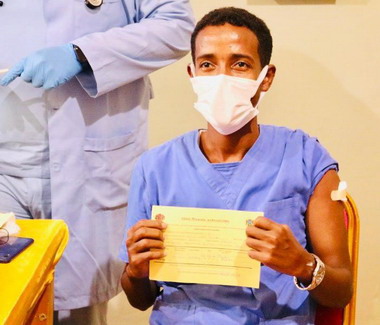 As a medical doctor working along the front lines of public health service, Dr Aweis Olow Hassan received his vaccine against coronavirus disease (COVID-19) at Banadir Hospital on 16 March 2021. Dr Hassan serves as a medical doctor and stabilization centre supervisor at the hospital. On a regular day at work, Dr Hassan spends his time visiting patients and supervising staff at the nutrition unit, while concurrently training staff and medical students on the job.
As a medical doctor working along the front lines of public health service, Dr Aweis Olow Hassan received his vaccine against coronavirus disease (COVID-19) at Banadir Hospital on 16 March 2021. Dr Hassan serves as a medical doctor and stabilization centre supervisor at the hospital. On a regular day at work, Dr Hassan spends his time visiting patients and supervising staff at the nutrition unit, while concurrently training staff and medical students on the job.
As part of his hospital’s infection prevention and control committee, for the last year, Dr Hassan avoided being infected by COVID-19 thanks to his diligence in wearing a face mask and handwashing. It also helped that the team at the Banadir Hospital ensured they had handwashing stations at the entrance of the facility and in every ward.
At first, when Dr Hassan used to wear a face mask outside of the hospital, people would stare at him, shouting, “Corona! Corona! Corona!”
He adds people didn’t believe how serious COVID-19 could be, and thought it was just a common cold. But when some families started to lose their loves ones, they realized how big this was. With the ongoing wave though, Dr Hassan feels more and more Somalis are wearing face masks and taking precautions.
Dr Hassan, who is a researcher, actively follows news from the World Health Organization (WHO), United States Centers for Disease Control and Prevention (CDC) and European Medical Agency (EMA) online. Well before Somalia had access to COVID-19 vaccines, Dr Hassan often wondered how he could get vaccinated against COVID-19.
He is dismayed that the rumour mill continues to churn out misinformation though. He explains that he would like to assure people that the clinical trials for the COVID-19 vaccine were conducted extensively, and are now over. Now, there is confidence in the safety of vaccines being offered. Even the rumours about blood clotting have been cleared by studies.
“One thing is for certain,” says Dr Hassan, “COVID-19 can kill and vaccines do not. On the contrary, vaccines save lives. It’s as simple as that.”
For now, Dr Hassan requests all people who receives vaccines to share their experiences on social media and within their communities.
“A lot of my medical colleagues stood back and waited for me to get vaccinated first. Once they saw I had no side-effects, apart from a sore arm – which is a common side-effect – my colleagues rushed to get the vaccine,” says Dr Hassan, proud of being a positive influence on his peers.
“Everyone should take the vaccine for the sake of their own safety and that of the community,” adds Dr Hassan. “Sadly, we are losing our golden grandfathers, grandmothers and parents to COVID-19. Please let’s all wear masks, wash hands and take vaccines. I would like to share my messages that I spread and would like others to use them too:
Before vaccines - #Waan qaadanayaa talaalka (I will be vaccinated) and after vaccinations - #Waan qaatay talaalka ee fadlan adigana qaado (I took the vaccine and you should go get vaccinated).
Access improving slowly but health equity a big challenge
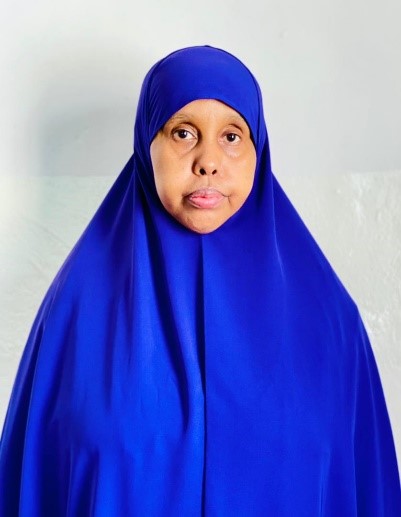 “I am so grateful to the Ministry of Health, WHO, the COVAX Facility and all other agencies who have brought COVID-19 vaccines to Somalia as we all know we don’t have money to buy these vaccines,” says Dr Luul Mohamud.
“I am so grateful to the Ministry of Health, WHO, the COVAX Facility and all other agencies who have brought COVID-19 vaccines to Somalia as we all know we don’t have money to buy these vaccines,” says Dr Luul Mohamud.
“This is such a great opportunity for all Somalis to take the vaccine. I just wish everyone could focus on the benefits of vaccinations instead of side-effects, as they are very rare indeed,” adds Dr Luul. “Besides even when children are vaccinated, sometimes they have very minimal side-effects. It is all a normal part of taking medicines.”
As the Dean of the Faculty of Medicine at the Jazeera University, a paediatric lecturer, and the former head of the paediatric department at the Banadir Hospital from 2007 to 2020, Dr Mohamud is a passionate advocate for vaccination.
She got vaccinated against COVID-19 at the Banadir Hospital on 20 March 2021, and after a while, returned to work with her face mask on again. Soon after this, she returned with her academic staff to help them get vaccinated too.
Dr Luul is also a member of the COVID-19 taskforce at the Somali Medical Association that worked with the Somali Government and partners on the preparation of protocols for COVID-19 case management, awareness raising, infection prevention and control, and training health care workers to address COVID-19.
Especially as she and her team members have been conducting online Zoom meetings to encourage people in the health fraternity and others to get vaccinated, Dr Luul is happy to see that vaccine acceptance is increasing.
“My message to all Somali people is to take vaccines – it is the only hope we have to defeat COVID-19 as our health system is very weak,” says Dr Luul. “We cannot treat all cases, especially critical cases, due to the lack of equipment and specialised personnel like anaesthetists. I do hope people take this seriously – COVID-19 is a deadly disease all around the world. Even developed countries have faced very high morbidity and mortality.
“On a related note,” she adds, “We need to increase overall vaccination around our country. As a health professional and with children of my own, I see Somali children dying every day due to vaccine-preventable diseases. We are looking at ways to increase our coverage and reach more children with routine vaccinations – and now we need to step up efforts and reach everyone possible with COVID-19 vaccinations.”
Our turn to give back and vaccinate our parents
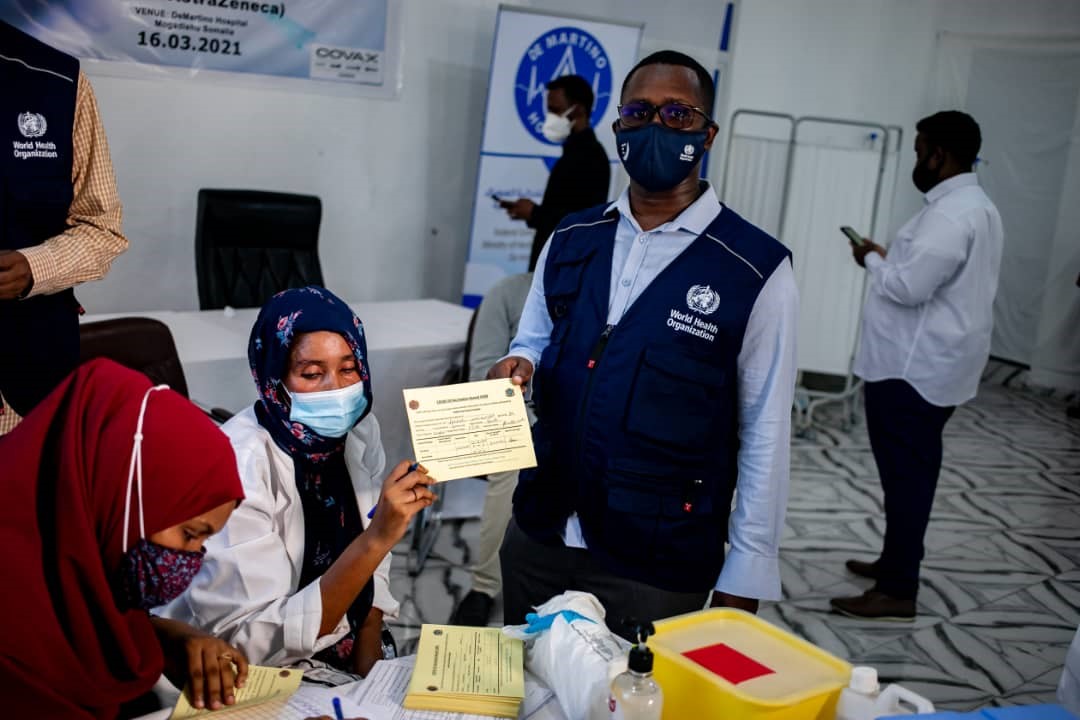 Dr Abdulkadir Mohamed Abdi, a young Somali doctor who serves as a public health officer at WHO, was fourth in line to be vaccinated against COVID-19 in Somalia.
Dr Abdulkadir Mohamed Abdi, a young Somali doctor who serves as a public health officer at WHO, was fourth in line to be vaccinated against COVID-19 in Somalia.
Inquisitive from the time he was young, when he learnt Somalia was going to receive the Oxford-AstraZeneca vaccines, Dr Abdulkadir decided to conduct some research to see why the country was receiving this particular vaccine over any other one. After reading extensively about vaccines available, and attending a WHO-led induction training on AstraZeneca vaccines, he learnt it was safe, effective and easy to store using the existing cold chain mechanisms and temperatures that Somalia offers.
Once his fears were allayed, he spoke to all his loved ones about vaccinations.
“I have convinced my parents to take the vaccine as I feel it is my turn to look after their health now,” Dr Abdulkadir says. “They had seen a lot of fake news about the vaccine from social media, but I asked them one question, “Did you get me vaccinated as a child?”
They chuckled and replied they had – and understood my message.
As part of his duties at work, Dr Abdulkadir engages with community members while supporting the Somali Government to trace, track and treat COVID-19 cases. He hears about people’s concerns about the COVID-19 vaccine and understands their doubts, but he urges Somalis to help each other understand the benefits of vaccination.
His message to Somali communities is to trust the COVID-19 vaccines. After all, every year, scientists have been working on technology to fight diseases. They are building on what they know to protect the world from new diseases.
People vaccinated so far in Somalia
As of 21 March, 1267 people had received COVID-19 vaccines in 4 of Banadir’s main hospitals – the Banadir Hospital, De Martino Hospital, Dr Sumait Hospital, and the Racip Tayip Hospital. Overall, 393 health workers, 129 municipal staff, 147 teachers, 111 members of the police force, 32 staff from points of entry and 455 elderly people received vaccines without any experiencing any major issues.
Meanwhile, vaccination teams in 17 of Banadir’s districts were trained in delivering and storing COVID-19 vaccinations. Additional health workers are also being trained in other states of the country.
From 21 March onwards, COVID-19 vaccinations started to roll out for frontline workers and elderly people with chronic conditions in Somaliland and Puntland.
Acknowledgements
WHO’s operational response to COVID-19 is supported by the following partners and donors:
- Gavi, the Vaccine Alliance
- Global Affairs Canada
- The Bill & Melinda Gates Foundation (BMGF)
- The COVAX Facility
- The European Union Delegation to Somalia (EU) and European
Commission's Humanitarian Aid Office (ECHO) - The Foreign, Commonwealth and Development Office (FCDO)
- The Global Fund
- The Swiss Agency for Development and Cooperation (SDC)
- The United Nations Central Emergency Response Fund (CERF)
- The World Bank
- German Humanitarian Assistance
- The African Development Bank
- The Italian Agency for Development Cooperation (AICS)
One year of COVID-19 in Somalia and the arrival of first vaccine shipment through COVAX
WHO’s work reflects show of strength, resilience and working together to save lives, prevent fragile health system from breaking down and support recovery
Mogadishu, 16 March 2020 – One year after the first case of coronavirus disease (COVID-19) was officially confirmed in Somalia, the Federal and State Governments of Somalia, in collaboration with World Health Organization (WHO), and other United Nations partners, are reflecting on the lives lost to the disease, while taking stock of crucial lessons learned, and huge strides made as the health system prepares to recover from the devastating impact of COVID-19.
Somalia is currently experiencing a new surge of COVID-19 cases: as of 14 March 2021, 9190 COVID-19 cases, including 367 associated deaths, were reported by the country. The current wave of COVID-19 is the worst since May-June last year, when the country experienced a possible peak after the first few laboratory-confirmed cases – which were all travel-associated – triggered community transmission across all parts of the country.

In the last 12 months, WHO spearheaded the battle against COVID-19 in Somalia, working in tandem with the United Nations Children’s Fund (UNICEF), United Nations Population Fund (UNFPA), United Nations Assistance Mission in Somalia (UNSOM), World Food Programme (WFP) and International Organization for Migration (IOM) among other partners.
“While we have been reflecting on how families have been affected socially and economically by COVID-19 in Somalia, we also commend the Government’s active response to it. Our response was mounted with speed and scale – from procuring the first batch of life-saving vaccines from the COVAX Facility in record time, to ensuring essential health services resumed and scaled up. We have worked on developing the capacity of the health workforce in the country to use evidence and science to operationalize the response, and build and strengthen the effective functioning of health institutions,” said Dr Mamunur Rahman Malik, WHO Representative for Somalia.
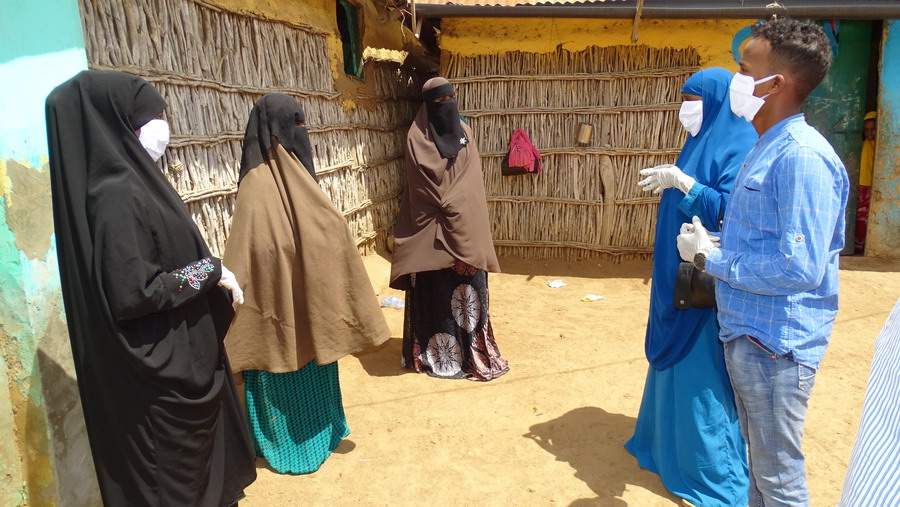
In the last year, WHO’s work in Somalia for COVID-19 response is reflected by these numbers:
- 3 polymerase chain reaction (PCR) based laboratories were set up in record time in Mogadishu, Hargeisa and Garowe for COVID-19 testing, as there was no testing capacity in-country.
- 73 rapid response teams were deployed for COVID-19 case investigation, alert verification and sample collection.
- 7343 health workers were trained in COVID-19 surveillance, case management and risk communication.
- 3327 community health workers were deployed for door-to-door visits for case finding and contact tracing as well as to disseminate public health and risk communication measure.
- 4.57 million households were visited to search for COVID-19 cases and contact tracing.
- 122 166 suspected cases were investigated and tested for COVID-19.
- 4422 COVID-19 samples were transported from inaccessible areas for testing.
- 19 isolation centres were supported for patient care per month, although not all were used every month.
- 694 health facilities were provided support through the Early Warning Alert and Response Network for early detection, investigation and response to COVID-19.
- 76 oxygen concentrators and three solar-powered oxygen systems were provided to/installed in health facilities.
In continued efforts to turn the tide against COVID-19, in 2021, WHO and UNICEF also supported the Government to secure 1.2 million doses of the Oxford-Astra-Zeneca vaccine to vaccinate frontline workers, the elderly population and people with chronic health conditions, who comprise 3% of the population. In phases, the country is expected to receive additional vaccines to cover 20% of its population.

On 15 March 2021, Somalia received 300 000 doses of the Oxford-Astra Zeneca vaccine, supplied by the COVAX Facility, as part of a first phase to protect frontline workers and elderly people with chronic health conditions.
As the country prepares to roll out the COVAX vaccines with cautious optimism that ending the pandemic from the country is now possible, WHO reflects on its work in the last 12 months, particularly on health system recovery. These continued efforts will include scaling up the availability of medical oxygen; investing in the health workforce in support of the International Year of Health and Care Workers; and boosting immunization efforts to protect children from life-threatening diseases.
“At this point, once again, we would like to laud health workers for their role in the fight against COVID-19,” said Dr Malik. “In the last year, 42% of all confirmed COVID-19 cases reported by the country were detected by community health workers who were trained and deployed by WHO in high-risk areas. We would also like to thank our donors for their untiring support, which is paving the path for a robust recovery of the health system in Somalia following COVID-19.”
WHO’s operational response to COVID-19 is supported by:
- Gavi, the Vaccine Alliance
- German Humanitarian Assistance
- Global Affairs Canada
- The African Development Bank
- The Bill & Melinda Gates Foundation (BMGF)
- The COVAX Facility
- The European Union Delegation to Somalia (EU) and European Commission's Humanitarian Aid Office (ECHO)
- The Foreign, Commonwealth and Development Office (FCDO)
- The Global Fund
- The Italian Agency for Development Cooperation (AICS)
- The Swiss Agency for Development and Cooperation (SDC)
- The United Nations Central Emergency Response Fund (CERF)
- The World Bank - Pandemic Emergency Financing Facility (PEF)
For additional information, kindly contact:
Fouzia Bano
+252619235880
Kindly visit the links below for more information:
Historical moment for Somalia as COVID-19 vaccines arrive through COVAX Facility
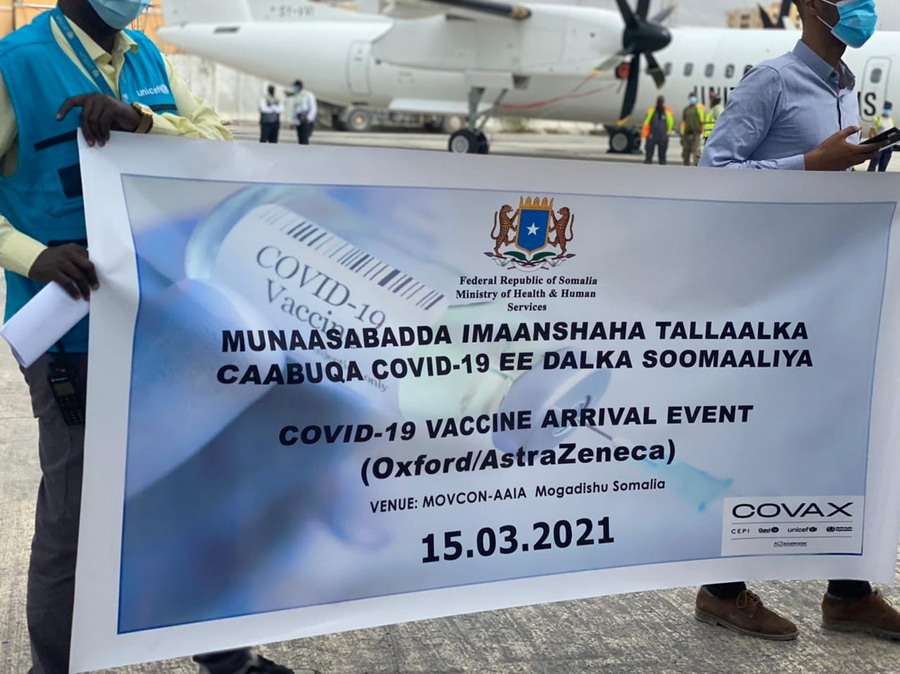
15 March 2021 – On the morning of 15 March 2021, a warm sun shone brightly on an airplane landing at the Mogadishu’s Adden Adde International Airport. After one year since the first COVID-19 case was officially confirmed in Somalia, on 16 March 2020, the country received part of the 300 000 doses of Oxford-Astra Zeneca vaccines from the COVAX Facility, which will be rolled out in the capital city. This consignment is a first of many, and will be used to protect frontline workers across all states of Somalia, including frontline health workers, the elderly and people with chronic health conditions.
Somalia’s Federal Minister of Health and Human Services HE Dr Fawziya Abikar Nur and her team received the vaccines. The United Nations Secretary-General’s Special Representative for Somalia James Swan, Deputy Secretary-General’s Special Representative for Somalia Adam Abdelmoula, and representatives and technical teams from the World Health Organization (WHO), United Nations Children’s Fund (UNICEF), the European Union Delegation to Somalia (EU) and World Food Programme (WFP) also joined the Federal Minister of Health in the historic moment.
Vaccines to contain spread of COVID-19
“This is a historic day for this country. Thanks to the vaccines received from the COVAX Facility and funding support from our partners, we can now protect the people at risk of being infected, who are working along the front lines of public service, in addition to vulnerable elderly populations,” said Dr Mamunur Rahman Malik, WHO Representative for Somalia.
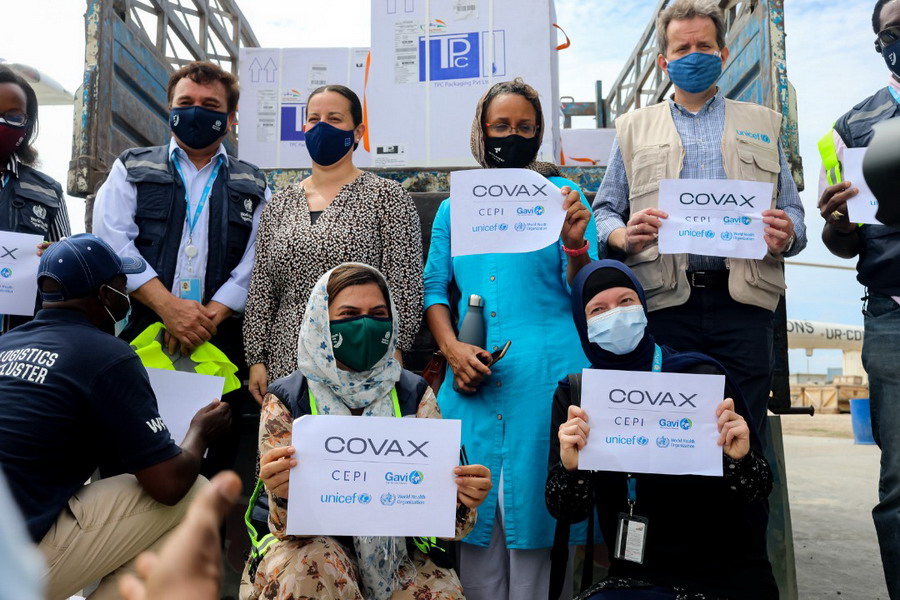
While we have lost many lives to COVID-19 and seen many people suffer, we have also taken huge strides in addressing this infectious disease. I commend all health workers who have helped us track, trace and test for COVID-19 cases in this country,” added Dr Malik. As of 15 March 2021, Somalia had reported 9190 laboratory-confirmed COVID-19 cases, including 367 deaths. Currently, the country is witnessing a new wave of the epidemic which is more severe and devastating than the last and the speed and scale with which the outbreak is evolving with this new wave has surprised all.
While calling on all frontline workers and eligible people to receive their vaccines, HE Dr Fawziya Abikar Nur added, “The vaccines have helped other countries slow down the transmission and infection rate and we are confident they will do the same for our population.”
Intense preparations under way for COVID-19 vaccinations
In preparation for the rollout of COVID-19 vaccines across the country, the Federal and state Ministries of Health collaborated with WHO and UNICEF to conduct intense training to acquaint technical teams and health workers on COVID-19 vaccination. Trainees had a chance to get to know the characteristics of the Oxford-Astra Zeneca vaccines, and learn about vaccine storage, handling and delivery, waste management, injection safety, vaccine delivery strategies, dealing with adverse events following immunization, and increasing demand for and trust in vaccines. They also had the opportunity to refresh their memories on COVID-19 infection prevention and control measures. Meanwhile, in the lead up to vaccination rollout, teams of social mobilizers were also able to strategize on effective ways to engage Somali communities and other partners to prevent the spread of COVID-19.
COVAX Facility to provide more vaccines
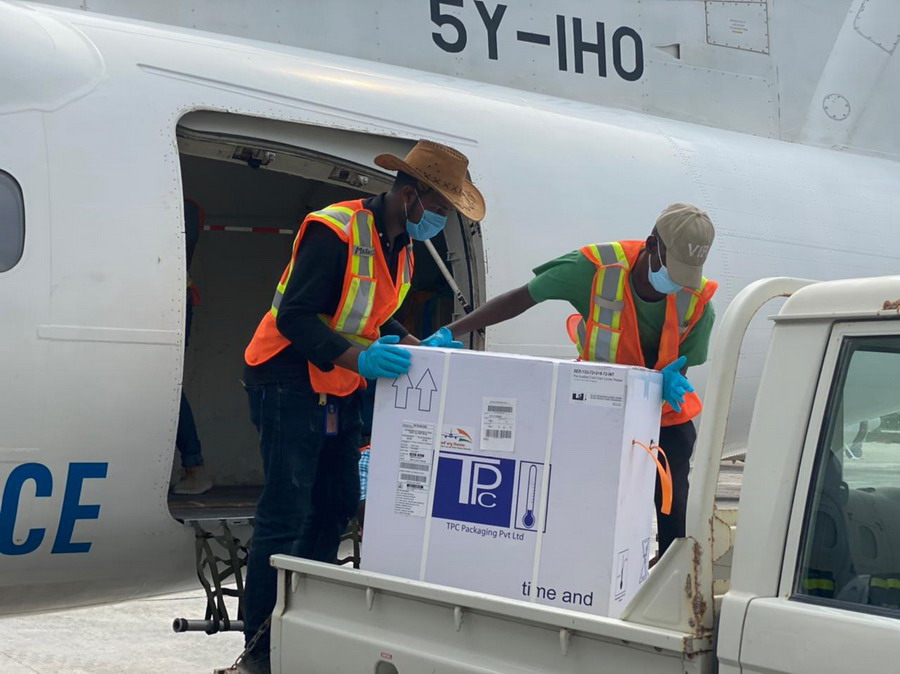
While vaccination is expected to roll out in Mogadishu’s main hospitals this week, people from other federal states are expected to receive vaccines in districts from the week of 21 March 2021 onwards. As the Government and partners ship off additional vaccines to different states, additional flights and vehicles will deliver vaccines to the targeted populations across the country, using logistical systems set up through previous mass vaccination campaigns.
Overall, Somalia has secured enough vaccines from the COVAX Facility to vaccinate at least 20% of its population in phases. The COVAX Facility is co-led by Gavi, the Vaccine Alliance, WHO and the Coalition for Epidemic Preparedness Innovations (CEPI), working in partnership with UNICEF, and seeks to accelerate the development and manufacturing of COVID-19 vaccines, and to guarantee fair and equitable access for every country in the world.
The Government of Somalia, with support from WHO, UNICEF and partners, is also working on ways to provide vaccines for rest of its population.
WHO and SPIDER Center sign agreement to strengthen health information management in Somalia
Mogadishu, 8 March 2021 – On 25 February 2021, the World Health Organization (WHO) country office for Somalia and the SPIDER Center (based within University of Stockholm) signed a non-financial memorandum of understanding (MOU) to formalize a partnership that aims to develop an integrated and digital health information management system (HIMS) in Somalia.
Somalia’s health system has been weakened by decades of conflict and recurring natural disasters. In particular, Somalia lacks a comprehensive HIMS capable of electronically collecting and sharing information from community to national level. While WHO continues to explore possibilities of establishing an integrated disease surveillance and reporting (IDSR) system in Somalia, the SPIDER Center, alongside the Federal Ministry of Health and health authorities in Puntland, Galmudug and Banaadir, launched a 3-year project entitled “Health Alliance for Digital Development and Action”. The aim of this project, funded by the Swedish International Development Agency (SIDA), is to create and strengthen a HIMS in Puntland, Galmudug and Banaadir as a pilot project, which will then inform further development and expansion of such a system at national level across Somalia.
It is within this context that WHO and SPIDER have agreed to collaborate on developing this HIMS, as well as an IDSR system in the country. An audit and needs assessment will be used to determine what the best HIMS may be for Somalia, after which partners will work towards developing harmonized Standard Operating Procedures for its development. As the United Nations’ lead technical agency for health, WHO will offer technical support to this project and facilitate the identification of local opportunities for resource support. Overall, this collaboration will help strengthen Somalia’s health system, and how health data is stored, thereby improving health for all.
“WHO remains committed to working with SPIDER to improve the data management system in Somalia. Data remain the key for informed public health decisions. This collaboration will be pivotal in improving the capacity of the health workers in the country to collect, collate and analyze health and nutrition data in a way that helps them to measure health outcome and impact. We are hopeful that this collaboration will help the country to build its own capacity to monitor and track progress towards the Sustainable Development Goals by systematically analyzing the available health information,” said Dr Mamunur Rahman Malik, the WHO Representative to Somalia.
“This collaboration is a good starting point for engagement with key actors working to strengthen Somalia’s health system. An integrated HIMS ought to serve the needs of all actors in a health system. A multi-stakeholder approach is key to achieve consensus that creates a responsive and adaptable health system in Somalia. SPIDER and Stockholm University are happy to engage in these partnerships to consolidate resources required to realise the SDGs,” said Dr John Owuor, SPIDER’s director.
This MOU between WHO and SPIDER is part of a new, innovative partnership between WHO, Sweden and Somali health authorities, which aims to diminish persistent health problems by creating an independent National Institute of Health, as well as by modernizing the country’s HIMS. It is complementary to the MOU recently signed between WHO and the Public Health Agency of Sweden.
Related links


